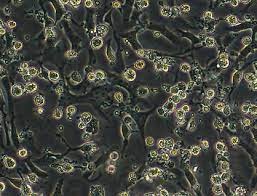BREAKING! Virus News: Novel Alongshan Virus (ALSV) Discovered In China In 2017 Now Found In Ticks In Switzerland That Can Cause Human Infection!
Virus News - Alongshan Virus (ALSV) Dec 08, 2022 3 years, 1 week, 5 days, 17 hours, 28 minutes ago
Virus News: Researchers from the Institute of Virology, Vetsuisse Faculty, University of Zurich, Zurich, Switzerland have issued warnings about the discovery of the novel Alongshan Virus (ALSV) in ticks in Switzerland with possible implications that the virus could be now widespread not only in Switzerland but in many parts of Europe!

The Alongshan virus (ALSV) is a member of the unclassified Jingmen virus group within the family of the Flaviviridae. In contrast to the viruses of the genera flavivirus, hepacivirus, pegivirus, and pestivirus, which have non-segmented genomes, the genomes of the unclassified Jingmen viruses are segmented.
Specifically, the ALSV genome consists of four segments of positive sense ssRNA. ALSV was first detected in China in 2017, in patients with a history of tick bites and tick-borne encephalitis virus (TBEV) symptoms but negative TBEV diagnostics. In 2019, ALSV was also detected in Ixodes ricinus ticks in Finland, but human infection cases were not found then.
Individuals infected with ALSV mainly present with fever and headache, and some patients are accompanied by clinical symptoms of fatigue, coma, depression, nausea, myalgia/arthralgia, and skin rash.
https://pubmed.ncbi.nlm.nih.gov/31141633/
There is no effective vaccine and drug available for ALSV. A better understanding of the pathogenic mechanism of ALSV would contribute to the development of vaccines and antiviral drugs.
The ALSV or Alongshan virus was only discovered in China only five years ago and many studies are still underway about the long-term health issues it causes to those that are infected with it.
Worryingly, researchers at the University of Zurich have now found this novel virus for the first time in Swiss ticks and it appears to be at least as widespread as the tickborne encephalitis virus and causes similar symptoms.
The study team has also started working on a diagnostic test to assess the epidemiological situation.
Typically, ticks can transmit many different pathogens such as viruses, bacteria, and parasites. Of particular concern are the tickborne encephalitis virus (TBEV), which can cause inflammation of the brain and of the linings of the brain and spinal cord, and bacteria leading to the infectious Lyme disease (borreliosis).
Alarmingly, the list of pathogens transmitted by ticks continues to increase.
The study team have now detected the Alongshan virus (ALSV) for the first time in ticks in Switzerland and also suspect that the novel virus could also be widespread in many parts of Europe now.
The ALS virus is a member of the flavivirus family along with the TBE virus. It was found in China in 2017 that many individuals after being bitten by ticks, suffered from fever and headaches which are the typical symptoms of a TBE infection. However, no antibodies against the TBE virus or its genetic material could be detected in the affected individuals. Instead, the Chinese researchers found a previously unknown RNA virus, the Alongshan virus.
The Swiss study team said that the complete gene sequence of ALS viruses was found in numerous tick samples collected in several regions of Switzerland in 2021 and 2022.
Dr Cornel Fraefel, director of the Institute of Virology at Zurich told
Virus News reporters from Thailand Medical News, "Surprisingly, ALS viruses were detected in the tick samples far more frequently than TBE viruses.”
Dr Fraefel warned that since the symptoms of an infection with ALS viruses are similar to those of an infection with TBE viruses, the Alongshan virus could already pose a public health concern in Switzerland, albeit hitherto unrecognized.
He also warned that unlike for the TBE virus, there are currently no vaccination or serological detection methods for the ALS virus.
He added, "Now that we have identified the new virus and published the complete viral genome sequence, our study team is developing a serological test to detect ALS virus infections in patients' blood samples.”
He further added that in collaboration with the national reference laboratory for tickborne diseases and the Spiez laboratory, the study team plan to investigate the epidemiological spread of ALS viruses in Switzerland next year.
The study findings of the discovery of Alongshan virus in ticks in Switzerland were published in the journal Zenodo.
https://zenodo.org/record/7403328#.Y5FHrmgzaUk
For the latest
Virus News, keep on logging to Thailand Medical News.
